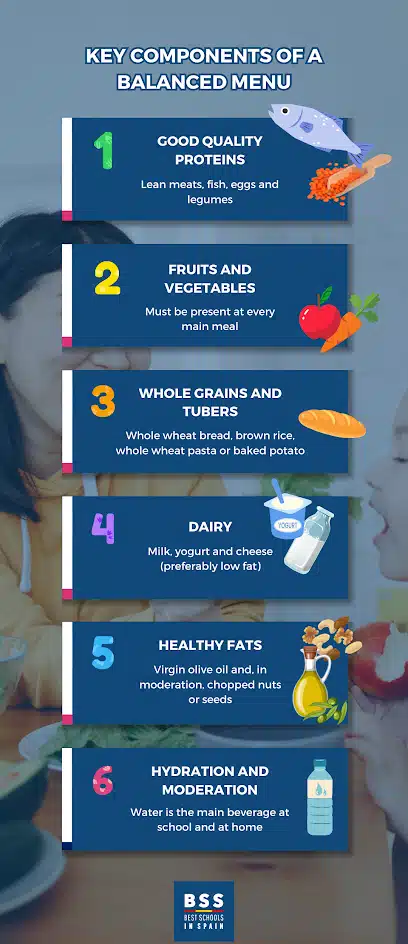A healthy diet during childhood is pivotal to children’s optimal development. It supports physical growth, fortifies the immune system and enhances cognitive performance —improving attention, memory and learning—while also fostering emotional wellbeing. For international parents considering private schools in Spain, understanding the combined efforts of school and home in safeguarding nutrition is essential. Within the Best Schools in Spain (BSS) network, we regard child nutrition as integral to a holistic education. Consequently, we promote consistent healthy habits from the school refectory to the family table, ensuring continuity that benefits pupils at every stage.
If you are seeking healthy menus for schools, this will be of interest to you.
The importance of appropriate nutrition in early life
From the earliest years, a varied and balanced diet establishes the groundwork for lifelong health. An equilibrated meal in childhood provides the energy required for play, study and exploration. High-quality nutrients (proteins, vitamins, minerals and healthy fats) are indispensable for building strong bones and muscles and facilitating brain development. Lean proteins and omega-3 fatty acids, for instance, contribute to cognitive development and concentration. Fruit, vegetables and whole grains, rich in vitamins and fibre, help prevent anaemia, regulate bowel function and strengthen defences against disease.
Diet also influences mood and behaviour. Excess sugar or highly processed foods may cause sharp fluctuations in energy and temperament, whereas nutrient-dense meals support emotional balance. Establishing healthy eating habits early teaches children to associate food with wellbeing rather than with reward or punishment. Paediatric experts note that eating patterns learned in youth often persist into adulthood; cultivating good habits now therefore helps to avert future problems such as obesity or diabetes.

Healthy menus in Spanish private schools
Private schools in Spain typically implement nutritionist-designed meal plans tailored to each age group and aligned with a healthy-lifestyle ethos. Recent Spanish regulations require school caterers to offer fresh fruit and vegetables daily and to prohibit sugary drinks at mealtimes, measures that dovetail with the Mediterranean model adopted by many private schools: home-style dishes prepared with natural ingredients and minimal processed sugar.
BSS refectories employ rotating, balanced menus that include legumes, fish, poultry, eggs and dairy, as well as a wide variety of fruit, vegetables and (preferably) whole-grain cereals. Many schools run food-education workshops for parents and pupils and share weekly menus in advance, enabling families to complement school meals at home. Following a ‘moderation in all things’ policy, BSS schools encourage children to try new flavours, avoid heavy fried foods and enjoy fruit- or yoghurt-based desserts instead of industrial pastries.
Core components of a balanced child menu
A well-balanced child menu should draw from every basic food group and respect age-appropriate portions:
High-quality proteins: Lean meats (chicken, turkey, beef), fish particularly oily species such as salmon or sardine rich in omega-3 eggs and legumes.
Fruit and vegetables: Present at every main meal. A variety of colours and types (Carrots, peppers and broccoli; apples, melon and kiwi) ensures a broad nutrient intake.
Whole-grain cereals and tubers: whole-meal bread, brown rice, whole-wheat pasta and baked potatoes deliver long-lasting energy and fibre.
Dairy products: Milk, yoghurt and cheese (preferably reduced-fat) furnish calcium and vitamin D for robust bones and teeth.
Healthy fats: Extra-virgin olive oil in cooking, plus moderate amounts of chopped nuts or seeds.
Hydration and moderation: Water as the principal beverage; sweets and sugary drinks only occasionally.
Practical guidance for healthy eating at home
Plan weekly menus: varied planning avoids last-minute, less healthy choices and involves children in selecting foods.
Maintain five daily eating occasions: do not skip breakfast; offer nutritious mid-morning and afternoon snacks.
Cook together: involving children in meal preparation builds skills and mindful eating habits.
Offer nutritious snacks: swap industrial snacks for vegetable sticks with yoghurt dip or unsweetened dried fruit; fresh fruit remains the default dessert.
Promote water: encourage regular water intake, avoiding commercial soft drinks and juices.
Limit fast food: treat pizzas, burgers and crisps as occasional, or prepare healthier homemade versions.
Small, sustained changes boosting vegetable consumption, swapping biscuits for fruit produce significant long-term benefits. Consistency is key: food should never serve as a reward or punishment.
School–family collaboration: embedding durable healthy habits
Habits endure when school and family act in concert. BSS cultivates ongoing communication: parents receive regular refectory menus, nutrition workshops and educational materials to support healthy eating at home, ensuring coherent messages in both settings.
If the school organises a vegetable-garden project or healthy-breakfast day, parents can participate by providing seasonal fruit or recreating school recipes. Conversely, when a family reduces sugar at home, the school supports the decision with fruit-based desserts or unsweetened plant-based milks. This educational synergy enhances children’s autonomy in choosing good foods: when the same habits are valued at school and home, children internalise them more readily.
Conclusion: Child Nutrition, The Bedrock of Healthy Growth
Child nutrition is a cornerstone of children’s wellbeing and learning. A varied, healthy menu at school, complemented by balanced meals at home, supplies the energy to play and learn while preventing future disease. Best Schools in Spain (BSS) embeds these principles in its educational programme: balanced menus, promotion of fresh, seasonal produce and a strong commitment to guiding families towards healthy habits.
Choosing a school that safeguards pupils’ overall health entails valuing its daily food provision. At BSS we are proud to promote healthy menus for schools, educating pupils in healthy habits from an early age and ensuring balanced cuisine forms part of every child’s happy development.
If you are looking for a school that prioritises high-quality nutrition, explore the educational options offered by BSS and discover how to transform your children’s education.


